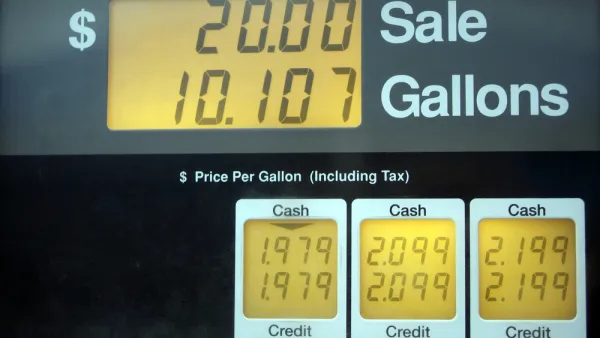One would expect the Utah Taxpayers Association to oppose county measures to increase general sales taxes by .25 percent to fund transportation programs, so their endorsement of an alternative revenue option, the mileage fee, is surprising.
Even before the five-cent gas tax increase goes into effect on January 1, counties in Utah will have the option to allow voters to increase general sales taxes by one-quarter percent in November due to a provision in the the legislation signed in March by Republican Gov. Gary Herbert.
The group makes clear they are for good roads and transit—it's the non-user fee mechanism, the sales tax "which has no direct correlation to Utah’s roads" they oppose.
Instead of trying to hide the cost of Utah’s roads in a sales tax, Utah’s lawmakers need to be innovative and forward thinking in how the state can ensure the transportation funding system is sustainable long term.
They need to consider a vehicle miles traveled (VMT) system of assessing individual road use and funding highways. This type of funding mechanism would ensure that the cost of roads is borne by the users and would prevent alternative fuel users from avoiding paying their fair share for the use of the state’s transportation system.
The group adds that "Utah is already part of a twelve state coalition [PDF] studying VMT as a way of funding highways. Your Utah Taxpayers Association encourages greater exploration into VMT by UDOT and the State Legislature."
Notwithstanding this recent endorsement of user fees, it did not prevent the group in March from blasting Gov. Herbert for signing the gas tax increase legislation.
Sales tax revenues raised on a local level would be substantial. If all counties agree to put the transportation sales tax measures on the ballot and they all pass, the revenues would be twice the amount of the additional five-cent gas tax in 2016 according to a fiscal note in HB 362, adds the taxpayers association.
What may be particularly noteworthy about the group's position, in addition to a taxpayer group endorsing a mileage fee, is that heretofore most comparisons have been between gas taxes and vehicle-miles-traveled fees, not the latter and sales taxes.
While the Utah Taxpayers Association may be the first, if not only taxpayers group to support a VMT fee, they are certainly not alone.
A July survey of transportation professionals by Politico found that respondents agreed that "(t)he gas tax, our main source of highway money since the 1950s, is probably doomed" and that "the most promising idea, to judge by the numbers, is to charge individual drivers a mileage fee."
FULL STORY: Counties Should Reject the Local Option Sales Tax for Roads

Analysis: Cybertruck Fatality Rate Far Exceeds That of Ford Pinto
The Tesla Cybertruck was recalled seven times last year.

National Parks Layoffs Will Cause Communities to Lose Billions
Thousands of essential park workers were laid off this week, just before the busy spring break season.

Retro-silient?: America’s First “Eco-burb,” The Woodlands Turns 50
A master-planned community north of Houston offers lessons on green infrastructure and resilient design, but falls short of its founder’s lofty affordability and walkability goals.

Test News Post 1
This is a summary

Analysis: Cybertruck Fatality Rate Far Exceeds That of Ford Pinto
The Tesla Cybertruck was recalled seven times last year.

Test News Headline 46
Test for the image on the front page.
Urban Design for Planners 1: Software Tools
This six-course series explores essential urban design concepts using open source software and equips planners with the tools they need to participate fully in the urban design process.
Planning for Universal Design
Learn the tools for implementing Universal Design in planning regulations.
EMC Planning Group, Inc.
Planetizen
Planetizen
Mpact (formerly Rail~Volution)
Great Falls Development Authority, Inc.
HUDs Office of Policy Development and Research
NYU Wagner Graduate School of Public Service


























